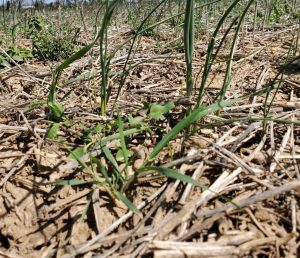
Wild garlic in soybean stubble planted to a late fall grain covercrop
Wild garlic dominates cropland and pastures throughout Salem County this spring. A few observations of star-of-bethlehem are also noted.
Due to the excessive rainfall last year, assume abundance of wild garlic bulbs are sprouting in small grains in fields known to have an infestation. Due to crop height and density, garlic leaves are difficult to discern as the grain crop canopies.
The window to manage wild garlic in small grains is dependent on crop stage and choices are limited to the growth regulator 2, 4-D, and the acetolactate synthase inhibitors chlorsulfuron and metsulfuron which inhibit cell division in growing tips of roots and shoots.
If uncontrolled and allowed to produce aerial bulblets, the ‘garlic’ smell taints harvest loads resulting in cents on the bushel dockage at the grain elevator. This is especially true of harvest intended for bread milling (know your contract).
In pastures, yards and other areas where livestock or children venture, it is important to note if the infestation is star-of-bethelehem, as this weed is very toxic to horses. Children, especially young children under the age of six should not be allowed to handle star-of-bethelem due to its toxicity if ingested. Ornithogalum umbellatum and others in this genus have a distinct white mid-rib, mostly white star-shaped flowers, and do not smell like onion or garlic.
If harvesting your crop to sell as seed lots, know that wild garlic, (Allium vineale) and wild onion (Allium canadense) are restricted weed seeds in seedlots sold in New Jersey. “The following seeds may be present in a seed lot, but shall be listed on the label under the heading “Noxious Weed Seed.” The name and number per pound must be declared. The terms “free” and ” none” shall mean that no noxious weed seed was found in a test conducted using the Association of Seed Analysts (AOSA) established methods” – NJ Department of Agriculture Noxious Weed Seed Regulations https://www.nj.gov/agriculture/divisions/pi/prog/noxious.html

